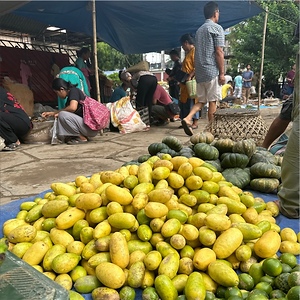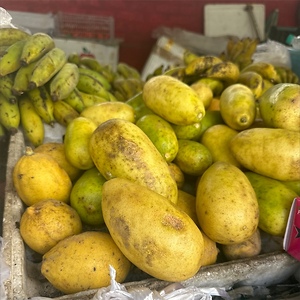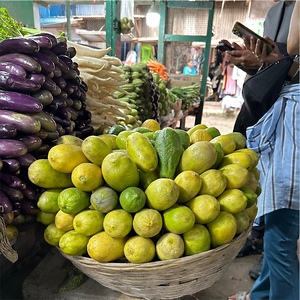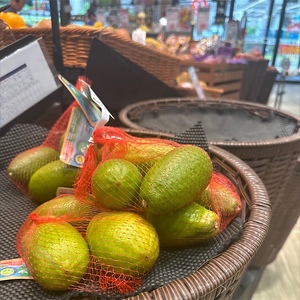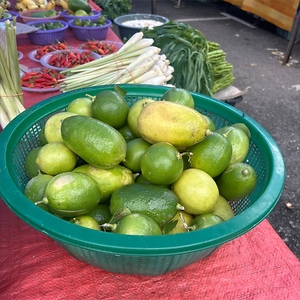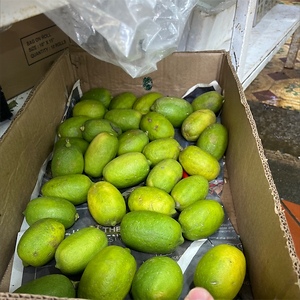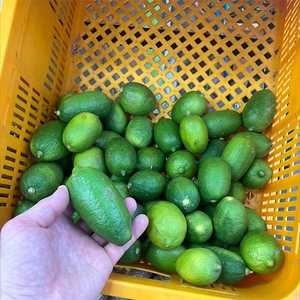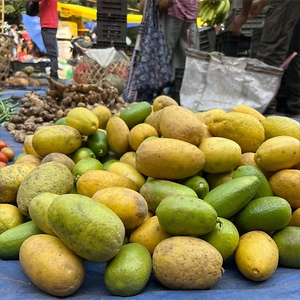


Kaji Nemu Lemons
Estimated Inventory, lb : 0
Description/Taste
Kaji Nemu lemons are a medium to large varietal, averaging 60 to 100 grams in weight and 6 to 11.5 centimeters in length, and have an elongated, oblong, elliptic, to obovate shape. The variety is larger than other commercial lemons grown in Assam, India, and the rind is thin, glossy, and taut, ranging in texture from smooth, rough, to pebbled. The rind transforms from dark green to golden yellow when ripe, and the surface is covered in prominent oil glands that contain aromatic volatile oils. A thin, white, spongy pith underneath the rind encases pale yellow flesh. The flesh is divided into 9 to 12 segments by thin membranes and is aqueous, tender, seedless, soft, and succulent. Kaji Nemu lemons are known for their scent, releasing a bright, energizing fragrance reminiscent of a combination of bergamot, lemons, and lime. The lemons can be used raw and have a refreshing, subtly sweet, sour, mildly acidic, and slightly bitter taste.
Seasons/Availability
Kaji Nemu lemons are available year-round, with a peak season from June to July and December through January.
Current Facts
Kaji Nemu lemons, botanically classified as Citrus limon, are an Assamese variety belonging to the Rutaceae family. The elongated citrus grows in clusters on evergreen trees and is one of the most commercially produced lemons in Assam, a state in northeastern India. There are several varieties of lemons grown in Assam, all generally labeled under the name Assam lemons, but there are two main commercial lemons categorized under the name Nemu Tenga: Gol Nemu lemons and Kaji Nemu lemons. Gol Nemu lemons, also known as Gul Nemu, are small, sweet, and round fruits, while Kaji lemons, also known as Kazi lemons, are larger, juicier, and more elongated fruits. Kaji lemons are only grown in Assam and are exported throughout India as a culinary and medicinal citrus. The variety is also exported to London and Dubai as a source of income for various villages in Assam. Kaji Nemu lemons fruit year-round and are favored for commercial purposes as the fruits hang for extended periods on the tree without dropping. The citrus tree can also be planted among other crops such as dragon fruit, papaya, or pineapple to improve farming methods. Kaji Nemu lemons are traditionally incorporated into sweet or savory culinary preparations for added flavor and aroma. The fruits are an indispensable flavoring in Assamese cuisine and can be used fresh, cooked, or preserved. It is important to note that the term for citrus in India, nimbu or nemu, is a descriptor used interchangeably for both lemons and limes. In Assam, Kaji Nemu may be referred to as a lemon or a lime, but in most research, the variety is classified as a lemon.
Nutritional Value
Kaji Nemu lemons are a source of vitamin C to boost the immune system, vitamin A to maintain healthy organ functioning, potassium to balance fluid levels within the body, and iron to develop the protein hemoglobin for oxygen transport through the bloodstream. The variety is also a source of fiber to regulate the digestive tract, magnesium to control nerves, phosphorus to repair connective tissues, calcium to build strong bones and teeth, and other nutrients, including zinc, copper, niacin, folate, and B vitamins. In Assam, India, Kaji Nemu lemons are known as the “queen of all citrus fruits” and are used to treat digestive issues. The leaves and oils from the fruit are also used in aromatherapy.
Applications
Kaji Nemu lemons have a subtly sweet, sour, and aromatic nature suited for fresh and cooked preparations. The variety is revered for its fragrance throughout Assam and is primarily used as a freshly squeezed enhancement, adding a zingy, refreshing taste and fragrance. Kaji Nemu lemons can be sliced and squeezed over soups, curries, rice-based dishes, and vegetables. The lemons can also be incorporated into lemon chicken recipes, roasted meat dishes, dals, or squeezed over seafood, mainly fish. It is common for Assamese households to place a bowl of sliced Kaji Nemu lemons on the table for added flavoring, and the juice is often mixed into chutney, spreads, dressings, and dips. Kaji Nemu lemons are notably used to make tangy, spicy pickles. These pickles are used as condiments and placed on top of dishes. In addition to savory dishes, Kaji Nemu lemons complement sweet dishes such as cookies, cakes, and tarts. The lemons can also be cooked in sugar, candied, or added to custards and puddings. Beyond culinary preparations, Kaji Nemu lemons flavor lemonade, cocktails, tea, and various beverages. The lemons can also be dried for extended use or preserved for several years by being covered in salt for a few days, rubbed with mustard oil, and sun-dried. Kaji Nemu lemons pair well with bell peppers, tomatoes, potatoes, pumpkin, meats such as poultry, pork, fish, and duck, spices including turmeric, cumin, mustard seed, and coriander, and aromatics such as ginger, garlic, chile peppers, and onions. Whole, unwashed Kaji Nemu lemons will keep up to one week when stored at room temperature and for 2 to 4 weeks when kept in the refrigerator.
Ethnic/Cultural Info
Kaji Nemu lemons earned a Geographical Indication or GI Tag in Assam in 2019. The variety was recognized for its unique growth characteristics, flavor, shape, and aroma and is only grown in Assam, distinguishing it from other citrus cultivars grown in India. Even within Assam, there are over seventeen species and fifty-three varieties of citrus grown in the state. Of the fifty-three varieties, Kaji Nemu lemons are one of the most commercially produced for their fragrance, juiciness, and ability to remain on the tree without dropping. In the early 21st century, Kaji Nemu lemons were notably grown in the Aouhata Village in Assam for export to London and Dubai. The lemons provide a source of income for villagers, and the variety’s popularity overseas is increasing as more consumers are exposed to the fragrant fruits. Kaji Nemu lemons are also a common backyard plant in Assam and are grown as a symbol of pride and prestige for the local variety.
Geography/History
Kaji Nemu lemons are native to the state of Assam in Northeastern India. The variety was discovered growing as a chance seedling in the orchard of the Burnihat Citrus Station. The lemons were said to have originated from the variety known as Chinakaghi, a local cultivar from the Hashara Village in the district of Sivasagar. The newly discovered lemons were selected for propagation and were commercially released under the name Kaji Nemu lemons, Kazi Nemu lemons, and Assam lemons. Today, Kaji Nemu lemons are grown in home gardens throughout Assam and are also commercially produced in the towns of Nalbari, Golaghat, Aouhata, Nagaon, Barpeta, and Dima Hasao and the districts of Cachar, Sonitpur, and Chirang. The lemons are sold fresh through local markets, directly through growers, and select retailers throughout Assam. The variety is also exported to other regions of India and sent to countries including England, Japan, and the United Arab Emirates.
Recipe Ideas
Recipes that include Kaji Nemu Lemons. One
| A Farmgirl's Dabbles |
|
Lime Baby Cakes |



